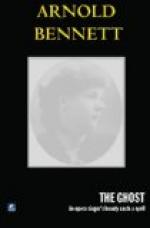“What—what?” I heard myself exclaim. “They must have plumped the brakes on pretty sudden.”
Then, quite after an interval, it occurred to me that this was a railway accident—one of those things that one reads of in the papers with so much calmness. I wondered if I was hurt, and why I could hear no sound; the silence was absolute—terrifying.
In a vague, aimless way, I sought for my matchbox, and struck a light. I had just time to observe that both windows were smashed, and the floor of the compartment tilted, when the match went out in the wind. I had heard no noise of breaking glass.
I stumbled slowly to the door, and tried to open it, but the thing would not budge. Whereupon I lost my temper.
“Open, you beast, you beast, you beast!” I cried to the door, kicking it hard, and yet not feeling the impact.
Then another thought—a proud one, which served to tranquillize me: “I am a doctor, and they will want me to attend to the wounded.”
I remembered my flask, and unscrewing the stopper with difficulty, clutched the mouth with my teeth and drank. After that I was sane and collected. Now I could hear people tramping on the ground outside, and see the flash of lanterns. In another moment a porter, whose silver buttons gleamed in the darkness, was pulling me through the window.
“Hurt?”
“No, not I. But if any one else is, I’m a doctor.”
“Here’s a doctor, sir,” he yelled to a gray-headed man near by. Then he stood still, wondering what he should do next. I perceived in the near distance the lights of a station.
“Is that Dover?”
“No, sir; Dover Priory. Dover’s a mile further on. There was a goods wagon got derailed on the siding just beyond the home signal, and it blocked the down line, and the driver of the express ran right into it, although the signal was against him—ran right into it, ’e did.”
Other people were crawling out of the carriages now, and suddenly there seemed to be scores of spectators, and much shouting and running about. The engine lay on its side, partly overhanging a wrecked wagon. Immense clouds of steam issued from it, hissing above the roar of the wind. The tender was twisted like a patent hairpin in the middle. The first coach, a luggage-van, stood upright, and seemed scarcely damaged. The second coach, the small, old-fashioned vehicle which happily I had abandoned at Sittingbourne, was smashed out of resemblance to a coach. The third one, from which I had just emerged, looked fairly healthy, and the remaining three had not even left the rails.
All ran to the smashed coach.
“There were two passengers in that coach,” said the guard, who, having been at the rear of the train, was unharmed.
“Are you counting me?” I asked. “Because I changed carriages at Sittingbourne.”
“Praise God for that, sir!” he answered. “There’s only one, then—a tall, severe-looking gent—in the first-class compartment.”




